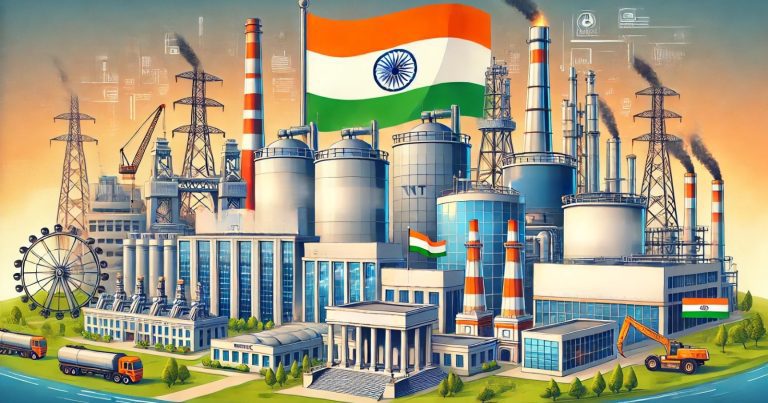The public sector companies in India play a vital role in economic growth, industrial development, and employment generation. These companies are government-owned and government-run organizations that provide basic commodities and services to the public. The public sector companies in India operate in various sectors, such as banking, insurance, energy, and infrastructure. Some of the biggest PSUs in India engage in industries such as oil, gas, coal, and electricity. Getting to know Indian public sector companies can help Indian students, professional economists, or even policymakers gauge its contribution to inthe Indian economy.
What is Public Sector?
Public sector companies, also called Public Sector Undertakings (PSUs), are those in which the government holds at least 51% of the shares. These companies are under the central or state government and provide essential goods, services, and employment opportunities.
Public sector entities are different because they mainly focus on social and economic objectives. They reduce inequality and provide universal access to essential services sustainably. The examples for public and private sector entities vividly illustrate the difference. Organizations like Indian Railways are government-owned public sector organizations, whereas Tata Group is a private entity that focuses on generating profits.
Public Sector Companies in India
The public sector companies cover several broad categories of industries and activities, many of which are important to national growth and welfare. Below are some public sector companies in india:
Indian Oil Corporation (IOC)
Indian Oil Corporation is refining crude oil and distributing all the petroleum products nationwide. It also supplies fuel in the forms of petrol, diesel, and LPG, to help maintain the industry’s energy demands and requirements, be it households or business organizations, thus maintaining an uninterrupted flow to the energy networks.
IOC is one of India’s major oil companies, and it caters to millions of customers every day. It helps ensure the nation’s energy security through reliable fuel supplies and infrastructure development like pipelines and storage facilities. Its operations promote economic growth and meet the growing energy needs of the increasing population.
Indian Railways
Indian Railways provides cheap and accessible transportation to millions of people every day. It connects cities, towns, and villages, making travel easy for citizens nationwide. It supports daily commutes and business activities by providing reliable passenger and freight services.
Indian Railways is the backbone of India’s travel and logistics network, transporting goods efficiently to support trade and creating a direct employment opportunity. Extensive connections through its network are unprecedented and essential to the nation’s infrastructure.
State Bank of India (SBI)
The State Bank of India offers various financial services to individuals, businesses, and rural communities. Savings accounts, loans, and investment options are offered by SBI, ensuring everyone gets a reliable banking solution regardless of their background. SBI supports millions of people in meeting their financial needs daily.
SBI is a trusted name in banking and has a very major role to play in financial inclusion. Through its wide branches and digital platforms, it reaches out to remote areas and empowers people with financial tools. Thus, the bank contributes to driving economic growth and enhancing living standards throughout India.
Bharat Heavy Electricals Limited (BHEL)
BHEL is one of India’s biggest public sector undertakings. Bharat Heavy Electricals Limited is a Maharatna CPSE which mainly focuses on producing equipment for power plants. This company serves the purpose in the Indian energy sector by manufacturing turbines, generators, transformers, and many more electrical equipment with improved technological support to increase power generation efficiency.
BHEL operates in diverse sectors such as transportation, defense, and renewable energy. The company provides equipment for thermal, hydro, and nuclear power plants. It is also committed to research and innovation to enhance its products. With the support to India’s power infrastructure, BHEL ensures stable and reliable electricity supply to homes and industries.
National Thermal Power Corporation (NTPC)
National Thermal Power Corporation, or NTPC, is India’s largest power generation company. A Maharatna CPSE generates electricity through coal, gas, hydro, and renewable energy sources. NTPC provides electricity to millions of households and commercial establishments, forming an integral part of India’s energy security. The company also focuses on minimizing environmental impacts by using cleaner technologies.
NTPC is increasing its renewable energy capacity through investments in solar and wind power projects. It is always trying to be efficient and cut carbon emissions. As a giant in the energy sector, NTPC has played a very important role in meeting India’s rising electricity demand while keeping the generation sustainable and environment-friendly.
Types of Public Sector Companies
Diverse in form, organizations of the public sector in India are comprised of all and sundry to develop, expand, and socially ascending the country’s economic activity. These services range from Central Public Sector Enterprises to Public-Private Partnerships, and the latter exists in various sectors working for the countries’ interests.
Central Public Sector Enterprises (CPSEs)
The public sector consists of enterprises where the central government has more than 50% equity participation. The companies deal with strategic industries like energy, defense, and transportation. PSUs are important in the economy because of these areas of concentration. Examples of the public sector are BPCL (Bharat Petroleum Corporation Limited) and SAIL (Steel Authority of India Limited).
The public sector operates at the guidance level of the Department of Public Enterprises in terms of following accountable and efficient working. It aims to support national development through necessary services and job creation, contributing significantly to every key sector for stimulating economic growth by maintaining the influence of the government on critical industries.
State Public Sector Enterprises (SPSEs)
SPSEs or state public sector companies are state-owned enterprises with majority equity shares. They concentrate on the fulfillment of specific states’ needs in the areas of water supply, electricity, and housing. Examples include the Maharashtra State Electricity Distribution Company and the Gujarat Mineral Development Corporation.
SPSEs are important for the regions’ development because they distribute resources fairly among states. It brings up local infrastructure and basic services to enhance the general living standard while helping the economic system flourish. It plays an important role in the equitable development of diverse regions.
Statutory Corporations
The statutory public sector is created through acts of the Parliament or the state legislatures. The most crucial aspect of such organizations is serving public welfare and providing necessary services to citizens. The statutory public sector includes the LIC and RBI, which are excellent examples of economic importance.
The statutory public sector has more freedom than other public sector enterprises since they are not subject to bureaucratic controls. This means they can make decisions faster and clearly focus on their goals. Their operations balance the general public’s welfare with bringing about vital services to promote national development.
Public-Private Partnerships (PPPs)
PPPs combine public and private sector expertise to pursue a common mission. It executes the delivery of infrastructure and social projects more efficiently as they can mobilize public and private sector strengths. The PPP example of one such project is Delhi Metro, which delivers world-class transport to people in this country.
The working of PPPs is the bringing together of infrastructure and policy support from the public sector and technical expertise and management skills from the private sector. This partnership helps PPPs complete projects on time, within budget, and to the desired quality standards. As a result, PPPs provide a win-win solution for both sectors, thus benefitting the community at large.
Maharatna, Navratna, and Miniratna PSUs
Public Sector Undertakings, or PSUs, can be categorized as Maharatna, Navratna, and Miniratna, depending on their financial health and operating freedom. Maharatna PSUs- Oil and Natural Gas Corporation and NTPC are the two largest and most influential PSUs that contribute heavily to India’s economy. Navratna PSUs-They include BHEL and BEL and belong to the middle-order category with good performance. Miniratna PSUs are small-size PSUs that are profitable: RailTel and IRCTC.
This classification system provides PSUs with financial autonomy and allows them to make decisions more quickly. Maharatna and Navratna PSUs have more autonomy regarding expansion and global competition, while Miniratna PSUs emphasize efficiency and sustainable development. These categories enable PSUs to achieve national development more effectively.
Role of Public Sector Undertaking
Public sector undertakings are vital to a nation’s economic development and industrial growth. They have been instituted to correct market failures, grant fair access to resources, and better the welfare of people. Following is a detailed description of their roles:
- Infrastructure Development: PSUs invest in infrastructure projects like roads, bridges, ports, and power plants. Examples include NTPC (energy) and NHAI (transportation).
- Economic Stability: PSUs show stability of the industries in crucial sectors such as energy, transport, and manufacturing. State-owned industries control prices and maintain monopolies by providing commodities at nominal rates.
- Employment Generation: PSUs generate mass employment opportunities in rural and semi-urban areas. For instance, Indian Railways offers employment to millions of people, both directly and indirectly.
- Strategic Significance: PSUs in the defence, energy, and communication sectors provide national security and self-reliance. Examples are Hindustan Aeronautics Limited (HAL) produces aircraft for the Indian Air Force.
- Support to Small and Medium Enterprises: PSUs collaborate with SMEs by giving them contracts and creating an economic ripple effect. Examples are Bharat Heavy Electricals Limited (BHEL) supports local industries by outsourcing manufacturing components.
- Revenue Generation for the Government: Profitable PSUs generate substantial revenue for the government in the form of taxes and dividends. For example, ONGC and Coal India contribute to the government’s income.
- Rural and Social Development: PSUs take up projects related to developing rural infrastructure, education, and health. Examples include oil companies such as IOC, which sponsor the development of the rural economy as part of CSR activities.
Public Sector Companies FAQs
What is PSU full form?
PSU is the full form of Public Sector Undertaking, and it refers to companies which the government owns.
What are public sector companies in India?
Public sector companies in India are government-owned enterprises that operate in key industries like banking, energy, and infrastructure.
Which are the types of public sector companies in India?
There are three kinds of public sector companies in India: Maharatna, Navratna, and Miniratna, classified according to their financial status.
Which is the best insurance company in public sector?
Top two: LIC (Life Insurance Corporation of India) and New India Assurance
What is the role of public sector companies in India?
Economic growth, employment generation, infrastructure development, and energy security are some of the roles that public sector companies play in India.


